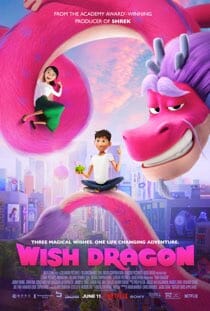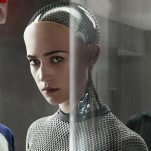The 32 Best Animated Movies on Netflix
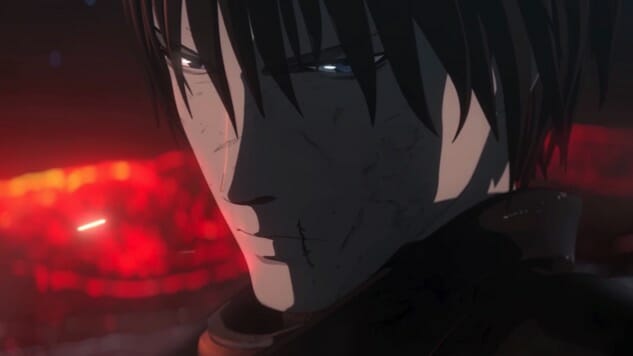
Netflix has doubled down on animated movies. Even while the overall movies section on the streaming giant has shrunk and Disney and Pixar have pulled their films for their own service, Netflix has grown ambitious in its own animated offerings. The streamer has quite a selection for children and adults alike. The anime section, in particular, has never been stronger. Since there’s no “Animated Movies” section on Netflix, finding them on the site can be a chore, but we’ve gone through all the kids and grown-up sections to select 32 animated movies streaming on Netflix that are worth your time. If you just want to find movies for the little ones to watch, you can also check out our guide to The 25 Best Kids Movies on Netflix Right Now.
Here are the 32 best animated movies on Netflix:
1. Guillermo del Toro’s Pinocchio
 Year: 2022
Year: 2022
Director: Guillermo del Toro, Mark Gustafson
Stars: Ewan McGregor, David Bradley, Gregory Mann, Ron Perlman, Finn Wolfhard, Christoph Waltz, Tilda Swinton, Cate Blanchett
Rating: PG
Guillermo del Toro has never shied away from infusing the harsh realities of life and death into the journeys of his young protagonists. His fascination with the intersections of childhood innocence and macabre whimsy are what make him the ideal co-director of Netflix’s newest Pinocchio adaptation, a work that marvelously marries the filmmaker’s flair for dark fantasy with the equally strange fairy tale elements of Carlo Collodi’s 1883 The Adventures of Pinocchio. Like all successful marriages, Guillermo del Toro’s Pinocchio brings out the very best of both parties. The stop-motion musical is an artistic triumph that colors Collodi’s cherished storybook characters with humanity and depth to craft a mature tale about rebellion, mortality and the love between a parent and child. This rendition marks the 22nd film adaptation of the Italian novel, and while it remains true to the grisly nature of Collodi’s original stories, it boldly departs from its dated moral lessons. In The Adventures of Pinocchio (and notable renditions thereafter), Pinnochio’s many escapades are structured as cause-and-effect narratives that serve to caution children against defiant behavior. In Disney’s 1940 animated feature, an evening of fun and relaxation on “Pleasure Island’’ nearly turns the wooden boy into a salt-mining donkey. In the original serial La Storia di un Burattino, delinquent behavior leads him to a gruesome death. These values of compliance and servility are reversed by del Toro’s fascist setting. In his Pinocchio, disobedience is a virtue—not a crime. These moral examinations are given a sense of urgency in death—a theme that informs so much of the film’s mind and soul. Where previous adaptations are preoccupied with life—with the puppet’s extraordinary consciousness and the hope that he may someday become a “real boy”—del Toro’s Pinocchio is interested in what our mortality can teach us about being human. In the film, death is never too far away from the protagonist or his loved ones. Death touches Carlo, then remains close to Pinocchio throughout his epic journey. The beauty of del Toro’s Pinocchio is that death isn’t treated with the usual dread and cynicism we typically see in the Western world. Here, death is mysterious, ethereal, soaked in gorgeous blue light. Death is not something to be feared, but respected and accepted when the time comes, because the notion that we will someday—maybe unexpectedly—leave this earth is what makes our time here so beautiful. I don’t typically advise listening to crickets, but believe Sebastian J., because the story of Pinocchio has never been told quite like this.—Kathy Michelle Chacón
2. Spider-Man: Across the Spider-Verse
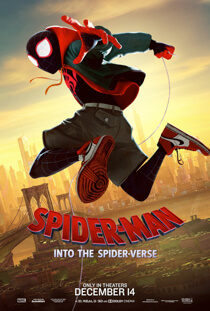 Release Date: June 2, 2023
Release Date: June 2, 2023
Director: Joaquim Dos Santos, Kemp Powers, Justin K. Thompson
Stars: Shameik Moore, Hailee Steinfeld, Oscar Isaac, Issa Rae, Jason Schwartzman
Rating: PG
Spider-Man: Across the Spider-Verse webs its way into a far more jaded world, one overstuffed with superhero sequels, and specifically, multiverse storytelling. And yet Spider-Man: Across the Spider-Verse swings in and, yet again, wipes the floor with its genre brethren by presenting a sequel that is both kinetic and deeply emotional. The script by Phil Lord, Christopher Miller and Dave Callaham (Shang-Chi and the Legend of the Ten Rings) smartly builds upon the foundation of its already established characters, their relationships and the ongoing consequences from the first film to further explore the lives of secret teen superheroes Gwen Stacy (Hailee Steinfeld) and Miles Morales (Shameik Moore) a year after the first film. The writers do so with a clear agenda to not only best themselves visually, but by upping the game of the now-familiar multiple-timeline tropes. Together with the talents of directing team Joaquim Dos Santos (The Legend of Korra), Kemp Powers (Soul) and Justin K. Thompson (Into the Spider-Verse), Across the Spider-Verse—across the board—swings for the cinematic fences in the rare sequel that feels like every frame has been crafted with the intention of wringing every bit of visual wonder and emotional impact that the animators, the performers and the very medium can achieve. The hybrid computer-animation meets hand-drawn techniques established in the first films returns with a more sleek execution that’s a bit easier on the eyes, which affords the animators to get even more ambitious with their array of techniques and character-centric presentations. The depth and breadth of the animation and illustration styles are jaw-dropping. There are frames you just want to fall into, they’re so beautifully rendered and conceived. If there’s any critique, it’s that the more action-centric sequences are almost too detailed, so that the incredible work of the animators moves off-screen so quickly that you feel like you’re not able to fully appreciate everything coming at you. As a middle film in the trilogy (Spider-Man: Beyond the Spider-Verse is due in theaters in 2024), it’s a joy to be able to say that Across the Spider-Verse stands well on its own, based on the merits of its story and stakes. There’s also a killer cliffhanger that sets the stage for a third chapter that doesn’t feel like it’s cheating its audience like some other recent films have done (cough Dune cough). In fact, repeat viewings of Across the Spider-Verse to bridge the gap until the final installment next year sounds like a great way to savor this film as it so richly deserves.—Tara Bennett
3. Paddington
 Year: 2014
Year: 2014
Director: Paul King
Stars: Hugh Bonneville, Ben Winshaw, Sally Hawkins, Julie Walters, Jim Broadbent, Peter Capaldi, Nicole Kidman
Genre: Adventure, Comedy
Rating: PG
The Paddington films exhibit a sense of wonder for the ordinary, most likely the product of director Paul King and co-screenwriter Simon Farnaby’s acute ability to instill a palpable desire of belonging into a CGI teddy bear voiced by Ben Whishaw. We have, for better or worse (and I would argue the former), reached a point in computer generated technology in which Paddington’s eyes can dilate realistically. His eyes, then, say everything, open to any modicum of familial comfort. It is extremely ordinary to want to be a part of something, to crave the intimacy of loved ones. The first Paddington, released in 2014, was emotionally prophetic in its illustration of the hokey moral panic wrought by xenophobes. Paddington arrives in London from the forests of Darkest Peru. He stands upon his suitcase, scruffy and innocent. Around his neck is a tag that says, “Please look after this bear.” The ways in which the commuters of Paddington Station ignore the bear could be written off as generic selfishness, but outsiders and the impoverished are deliberately ignored in metro areas, a point accentuated by Mr. Brown’s (Hugh Bonneville) claim of “stranger danger.” Still, Mrs. Brown’s (Sally Hawkins) gentle heart leads the family to quasi-adopt Paddington, their lives enriched by the bear’s earnestness and genuine desire to be part of their lives. —Kyle Turner
4. Kung Fu Panda
 Year: 2008
Year: 2008
Directors: Mark Osborne, John Stevenson
Stars: Jack Black, Dustin Hoffman, Angelina Jolie, Ian McShane, Seth Rogen, Lucy Liu, Jackie Chan, David Cross, Randall Duk Kim, James Hong
Genre: Action, comedy
Rating: PG
Like Stephen Chow’s Kung Fu Hustle, DreamWorks’ Kung Fu Panda punctuates its light-hearted, comedic tone with surprisingly poignant moments along with nonstop homages to a giant list of truly classic Kung Fu films, often scene by scene. Kung Fu Panda is the more tightly constructed film, though they both share a deep love for the genre that comes through when watching either film. Jack Black voices Po’s (totally awesome) journey from bumbling martial arts fanboy to unlikely hero with such sincerity that it’s hard not to get swept along, especially given the equally strong performances by Dustin Hoffman as the perpetually exasperated Master Shifu and Ian McShane as the menacing Tai Lung. —K. Alexander Smith
5. Blame!
 Year: 2017
Year: 2017
Director: Hiroyuki Seshita
Stars: Sora Amamiya, Kana Hanazawa, Takahiro Sakurai
Genre: Anime, Sci-Fi, Action
Rating: TV-14
When it comes to dark industrial sci-fi, Tsutomu Nihei is a visionary. Trained as an architect before pursuing a career as a manga author, Nihei’s art is simultaneously sparse and labyrinthine, his body of work defined by a unifying obsession with invented spaces. Byzantine factories with gothic accents spanning across impossible chasms, populated by bow-legged synthoids and ghoulish predators touting serrated bone-swords and pulsating gristle-guns. His first and most famous series, Blame!, is considered the key text in Nihei’s aesthetic legacy, going so far as to inspire everything from videogames, to music, and even art and fashion. Past attempts have been made to adapt the series into an anime, though none have been able to materialize successfully. That is, until now. With the support of Netflix, Hiroyuki Seshita of Polygon Pictures has delivered that long-awaited Blame! film. Set on a far-future Earth consumed by a massive, self-replicating superstructure known as ‘The City’, Blame! follows Killy, a taciturn loner, wandering the layers of the planet in search of a human possessing the ‘net terminal gene,’ an elusive trait thought to be the only means of halting the city’s perpetual hostile expansion. Boasting a screenplay penned by Sadayuki Murai, famed for his writing on such series as Cowboy Bebop and Satoshi Kon’s Perfect Blue, and supervised by Nihei himself, Seshita’s film abbreviates much of the manga’s early chapters and streamlines the story into an altogether more narrative and action-driven affair. Art director Hiroshi Takiguchi deftly replicates Nihei’s distinctive aesthetic, achieving in color what was before only monochromatic, while Yuki Moriyama capably improves on the uniform character designs of the original, imparting its casts with distinct, easily identifiable traits and silhouettes that greatly improve the story’s parsability. Blame! is as faithful an adaptation as is possible and as fitting an introduction to the series as the manga itself. Blame! builds a strong case for being not only one of the most conceptually entertaining anime films of late, but also for being one of, if not the best original anime film to grace Netflix in a long time. —Toussaint Egan
6. I Lost My Body
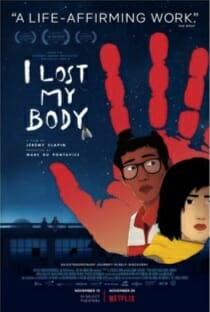 Year: 2019
Year: 2019
Director: Jérémy Clapin
Stars: Hakim Faris Hamza, Victoire Du Bois, Patrick d’Assumçao
Rating: TV-MA
While we’re on board, at least passively, for however many sequels Pixar wants to give Toy Story, patient for however long another one takes, I Lost My Body is a singular animated film, increasingly of the kind that, frankly, don’t get made anymore. Partly because hand-drawn features made by small studios are rarer than ever, but mostly because it’s a defiantly adult animated film, wreathed in oblique storytelling and steeped in grief. Ostensibly about an anthropomorphic hand climbing and skittering its way across the city to find the person to whom it was once attached—the story of its severing slowly coming to light—the beauty of director Jérémy Clapin’s images, often limned in filth and decay, is in how revelatory they can be when tied so irrevocably to the perspective of a small hand navigating both its nascent life in the treacherous urban underground and the traumatic memories of its host body’s past. I Lost My Body is an unassuming, quietly heartbreaking achievement, one the Academy needs to prioritize now more than ever over expectedly competent big studio fare. —Dom Sinacola
7. Mobile Suit Gundam: Char’s Counterattack
 Year: 1988
Year: 1988
Director: Yoshiyuki Tomino
Stars: Toru Furuya, Shuichi Ikeda, Hirotaka Suzuoki, Maria Kawamura, Nozomu Sasaki, Koichi Yamadera
Genre: Anime, Sci-Fi, Action
Rating: TV-14
The first Gundam theatrical film and final chapter in the original saga begun in 1979 with the “Universal Century Timeline” of the Mobile Suit Gundam TV series, Char’s Counterattack has the weight of three seasons of TV behind it. Yoshiyuki Tomino, creator of the Gundam series, directed and wrote the film, adapting it faithfully from his novel, Hi-Streamer. Widely considered the best film in the Gundam franchise, Char’s Counterattack is most successful at wrapping up the 14-year rivalry between the “hero” of the Earth Federation, Amuro Ray, and the leader of Neo-Zeon, Char Aznable. The story involves a classic Gundam dilemma: Char’s Neo-Zeon force attempts to drop an asteroid filled with nuclear weapons onto Earth, which would free the colonies from the yoke of oppression by their rivals, the Earth Federation, and kill everyone on Earth in the process. As with all of the best Gundam tales, Tomino approaches the story from a hard sci-fi point of view, clearly laying out the science behind things like giant mobile suits and “newtypes” (humans that have evolved to acquire psychic abilities). Tomino carefully lays out the reasoning behind Char and Amuro’s passions and hatreds, not allowing the viewer to choose a clear side. Gundam series have always been willing to take on discussions about the horrors of war and how mankind, for all its advancements, never seems to be able to free itself from humanity’s baser instincts. Char’s Counterattack attempts this as well, yet it’s mostly concerned with wrapping up the rivalry between Amuro and Char—and on that note, it succeeds wildly. Featuring gorgeous, tense fight sequences set in space, an excellent soundtrack by Shigeaki Saegusa, and some of the most lauded Gundam designs in the history of the franchise, the film is inarguably one of the high points of the Gundam Universe. One downside: If you don’t have the investment of spending hundreds of episodes of television with these characters, the plot can be confusing, and Char/Amuro’s ending will likely not resonate as strongly. Regardless, Char’s Counterattack remains a key moment in the Gundam universe, one still worth checking out almost 30 years later. Hail Zeon!—Jason DeMarco
8. The Mitchells vs. the Machines
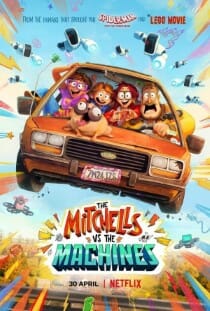 Year: 2021
Year: 2021
Director: Mike Rianda, Jeff Rowe (co-director)
Stars: Abbi Jacobson, Danny McBride, Maya Rudolph, Eric Andre, Fred Armisen, Beck Bennett, Olivia Colman
Genre: Comedy/Sci-Fi
Animated generational divides have never been more like a sci-fi carnival than in The Mitchells vs. the Machines. Writer/director Mike Rianda’s feature debut (he and co-writer/director Jeff Rowe made their bones on the excellently spooky, silly show Gravity Falls) is equal parts absurd, endearing and terrifying. It’s easy to feel as lost or overwhelmed by the flashing lights and exhilarating sights as the central family fighting on one side of the title’s grudge match, but it’s equally easy to come away with the exhausted glee of a long, weary theme park outing’s aftermath. Its genre-embedded family bursts through every messy, jam-packed frame like they’re trying to escape (they often are), and in the process create the most energetic, endearing animated comedy so far this year. And its premise begins so humbly. Filmmaker and animator Katie (Abbi Jacobson) is leaving home for college and, to get there, has to go on a road trip with her family: Rick (Danny McBride), her Luddite outdoorsy dad; Linda (Maya Rudolph), her peacemaking mom; and Aaron (Rianda), her dino-freak little brother. You might be able to guess that Katie and her dad don’t always see eye-to-eye, even when Katie’s eyes aren’t glued to her phone or laptop. That technocriticism, where “screen time” is a dirty phrase and the stick-shifting, cabin-building father figure wants his family to experience the real world, could be as hacky as the twelfth season of a Tim Allen sitcom. The Mitchells vs. the Machines escapes that danger not only through some intentional nuance in its writing, but also some big ol’ anti-nuance: Partway through the trip, the evil tech companies screw up and phone-grown robots decide to shoot all the humans into space. This movie needed something this narratively large to support its gloriously kitchen-sink visuals. The Sony film uses some of the same tech that made Spider-Man: Into the Spiderverse look so crisp and unique, adding comicky shading to its expressive CG. In fact, once some of the more freaky setpieces take off, you wouldn’t be surprised to see Miles Morales swing in to save the day. The Mitchells vs. the Machines’ spin on the Spidey aesthetic comes from meme and movie-obsessed Katie, whose imagination often breaks through into the real world and whose bizarre, neon and filter-ridden sketchbook doodles ornament the film’s already exciting palette with explosive oddity. This unique and savvy style meshes well with The Mitchells vs. the Machines’ wonderfully timed slapstick, crashing and smashing with an unexpected violence, balanced out with one truly dorky pug and plenty of visual asides poking fun at whatever happens to be going on.—Jacob Oller
9. Nimona
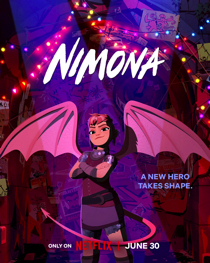 Year: 2023
Year: 2023
Director: Nick Bruno, Troy Quane
Stars: Chloë Grace Moretz, Riz Ahmed, Eugene Lee Yang, Frances Conroy, Lorraine Toussaint, Beck Bennett, Indya Moore, RuPaul, Julio Torres, Sarah Sherman
Genre: Fantasy
Rating: PG
Paste Review Score: 8.0
You know that joke about how we would all side with the queer-coded villains of our childhood? ND Stevenson’s now decade-old webcomic-turned-graphic-novel Nimona is a commitment to that bit. Like its source material, Nimona is a legend for the freaks and the queers, a story told in figures, archetypes and tropes. Nimona understands that villains are often made villainous for their bodies and identities. Nimona embraces queer coding and turns it into a subversive power fantasy. In the original webcomic, Nimona is a queer anarchist revolutionary who adopts the brown-skinned, disabled Boldheart as her master. He has found himself conned into maintaining the status quo as the villain that the forces of power in his kingdom need, but he gets to prolong his homoerotic rivalry with his nemesis and ex-lover, the Institute’s champion and white pretty boy, Goldenloin. Together, Nimona and Boldheart can, through villainy, actually take down the shockingly malicious Institute that maintains strict order over the kingdom and inspire their followers to see the world differently. There’s no sympathizing with royalists here. You should absolutely go read Nimona. It won’t take much longer to read than it will to watch the 99-minute film (and you should watch it after), but with that space, Stevenson establishes and subverts the archetypes and tropes that shape not just narrative, but world view. It’s not subversive of just form or structure, but of narrative and ideology. Now in the hands of Spies in Disguise directorial duo Nick Bruno and Troy Quane, Nimona is roughly the same chaotic gremlin that fans of Stevenson’s work loved—with some notable reworks to fit into an animated kids movie on Netflix. It kinda skips the whole villain arc of the original story, which I would be more annoyed about if the many other adjustments and the reworked scope didn’t make this such a good standalone adaptation. The movie still captures the heart of Nimona. It may make for a less subversive take on villainy, but remains a thoughtful commentary on systems of power and the othering of non-normative bodies. In many ways, it feels tailored for this moment, for this audience. —Autumn Wright
10. The Adventures of Tintin
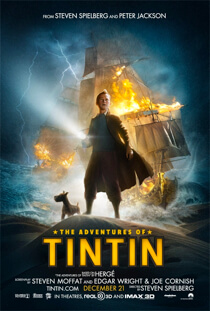 Year: 2011
Year: 2011
Director: Steven Spielberg
Stars: Jamie Bell, Andy Serkis, Daniel Craig, Nick Frost, Simon Pegg
Genre: Action & Adventure, Animation
Rating: PG
It’s actually amazing that 2011’s The Adventures of Tintin marked the first big screen treatment of the immensely popular comic book character for nearly 40 years (and, really, the first one of note originating from Hollywood, ever). After all, the intrepid carrot-topped reporter/sleuth stands with fellow Franco-Belgian characters Asterix and Obelix as a titan of European comics. Created by Belgian artist Georges Remi (under the pen name Hergé), Tintin’s adventures have been translated into more than 50 languages and inspired a decently rabid following of “Tintinologists” who have discussed, debated, critiqued and theorized on virtually every imaginable aspect of Tintin and his friends. Part of that can be attributed to careful guardianship of the property, first by Hergé himself and then by his estate. How else can one explain how a series started in 1929 and involving a resourceful boy and his resourceful and cuddly dog has escaped the clutches of the Disney merchandising behemoth? But then there’s also the fact that this film’s director, some guy named Steven Spielberg, held the film rights for nearly 30 years, waiting for the right moment to give Tintin his cinematic due. The Adventures of Tintin does just that. Not since Rob Reiner’s pop culture quote font, The Princess Bride, or perhaps Peter Jackson’s Lord of the Rings trilogy, has a film worked so hard—and so successfully—to capture the spirit of the source material. —Michael Burgin
11. Despicable Me
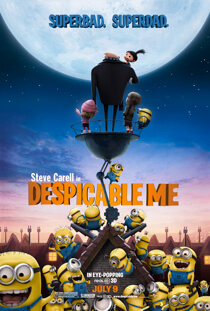 Year: 2010
Year: 2010
Directors: Pierre Coffin, Chris Renaud
Stars: Steve Carell, Jason Segel, Miranda Cosgrove, Russell Brand, Julie Andrews
Genre: Animation, sci-fi
Rating: PG
Followed by countless more franchise flicks and spin-offs, the original Despicable Me shines best by flattening the dichotomy between good guys and bad guys, removing all but the most heart-strings-tugging stakes from what would otherwise be a minefield of superhero and spy thriller movie tropes. In the world of career super villain Gru (Steve Carell, playacting a mouthful of an Eastern European accent), good guys are boring state-subsidized bureaucrats, and bad guys aren’t all that bad, just ambitious pseudo-scientists with big ideas and healthy competitive natures. They don’t actually want to hurt anybody. So, really, once Gru begins unwittingly step-fathering three young orphan girls (the youngest voiced adorably by Eighth Grade’s Elsie Fisher) he sheds all of his sociopathic tendencies to become an ersatz Good Guy replete with brand new nemesis, Vector (Jason Segal). Though the two sequels and standalone Minions vehicle needlessly complicate the DM mythos, further muddying Gru’s lineage and giving the Minions personalities (the funniest joke in this first film is how Gru talks to each Minion as if they are an individual being, giving them normie names, even though they are impossible to distinguish)–which then means we have to ask questions about how Minions procreate and/or go to the bathroom–the first Despicable Me movie is a pleasantly pure distillation of family-friendly values, slapstick and indifferent character designs, bolstered by a good joke or two. If only it ended there. Instead, we must wonder: If a Minion with its pants around its ankles has no genitals, is it really naked? —Dom Sinacola
12. The Monkey King
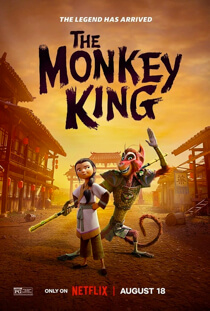 Year: 2023
Year: 2023
Director: Anthony Stacchi
Stars: Jimmy O. Yang, Bowen Yang, Jo Koy, Stephanie Hsu, BD Wong
Rating: PG
Paste Review Score: 9.0
The Monkey King journeys to the Western streaming services once more with Netflix’s animated adventure from director Anthony Stacchi (The Boxtrolls, Open Season). As a notorious trickster figure of Chinese mythology, The Monkey King’s story is told time and again. His appearance in the 16th century epic Journey to the West, in which he atones for his misdeeds by aiding a Buddhist monk traveling to India in search of scriptures, makes him a mischievous yet reforming character who models and satirizes ancient Chinese values. Netflix’s delightful retelling of The Monkey King’s story takes place before the events of Journey to the West. Hatched from a rock as a baby monkey with laser vision, our hero quickly learns he doesn’t fit in with the other monkeys. But tricksters are all outsiders, and The Monkey King (Jimmy O. Yang) embraces his liminal status, striking out on his own to meet his destiny. (Re)united with his staff, named Stick for this retelling (with sentient throat-singing by Nan Li), he foils the Dragon King (Bowen Yang) and sets off on a quest to join The Immortal Ones. But The Monkey King never ventures alone. This time he’s accompanied by Lin (Jolie Hoang-Rappaport), a headstrong young villager who is a bit of an outcast herself. Together they’ll journey to hell, heaven and back again, with a bit of havoc along the way. The Monkey King becomes a work of cosmic color that changes form almost as often as its main character. The animation styles whiz by in kaleidoscopic fashion. The few songs written by composers Toby Marlow and Lucy Moss are just as eclectic as the animation styles. Jimmy O. Yang voices our trickster hero with a fitting power and mischievousness. Bowen Yang’s wry and riotous performance as the Dragon King is nothing short of robe-dropping. Those who have grown up steeped in Chinese mythology and iterations of The Monkey King’s story will catch the continual references to other chapters in his saga and Chinese mythology in general. Still, The Monkey King feels like a proper place for experiments in cross-cultural entertainment because Journey to the West is a story of cultures mixing and learning. The film is an enjoyably swinging adventure across time, worlds, and cultures. It’s an enchanting reminder that mythology can be diplomatic and a wonderful way to venture into new worldviews. —B. Panther
13. The Sea Beast
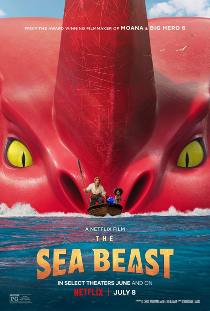 Year: 2022
Year: 2022
Director: Chris Williams
Stars: Karl Urban, Zaris-Angel Hator, Jared Harris, Marianne Jean-Baptiste, Dan Stevens, Kathy Burke
Rating: PG
Paste Review Score: 8.5
When cartographers allowed their senses of imagination and self-preservation to fill the unexplored regions of their maps, they used to warn of creatures like lions, elephants and walruses. Creatures beyond understanding, with teeth and trunks and tusks easy to caricature into danger. But we mostly remember that when you sail to the faded edge of knowledge, there be dragons. The Sea Beast deftly hones this ancient human fear into a sharpened spear tip, striking at ignorance. Its swashbuckling adventure navigates a sea filled with massive critters sure to whet kids’ appetites for piracy, Godzilla films and exciting animation. The first movie from longtime Disney story staple Chris Williams after leaving the House of Mouse for Netflix, The Sea Beast is, to paraphrase Jared Harris’ Ahab-like Captain Crow, all piss and vinegar. That the film even alludes to the phrase, and drops a few other lightly-salted lines you might expect from some seasoned sea dogs, is indicative of its separation from the sanitized juggernaut. It looks violence in the eye; it isn’t afraid to make its threats real. All rightfully so. Telling a tall tale of hunters—mercenary crews funded by a colonialist crown to take out the kaijus populating the ocean—wouldn’t be right without at least a little edge. Our way into the world, the young Maisie (Zaris-Angel Hator), has experienced its dangerous realities firsthand: Her parents went down with a ship, leaving her as one of dozens of hunter orphans. But that hasn’t stopped her from lionizing her martyred family (something explicitly encouraged by the monarchy) and seeking her own glory. Stowing away on Crow’s ship, the Inevitable, she and the capable Jacob (Karl Urban) find themselves confronting the legendary ambitions they’ve built up in their own heads. Williams and co-writer Nell Benjamin immediately drop us into the Inevitable’s quest to take out Crow’s toothy and horned Red Whale, dubbed the Red Bluster, with total confidence that there’s no time like maritime. As our eyes roll and pitch across the impressively realistic waves and our ears try to follow the meticulously detailed helmsmanship, the hunting scenes ensnare us like the catch of the day. We understand the hierarchy of the diverse crew, the honor code among hunters, the tactics needed to take down imposing creatures that look like Toho turned their greatest hits into Pokémon. It’s savvy and respectful writing, put into legible action by Williams’ skilled hand, that trusts in its setting and subject matter to be inherently cool, and in its audience to greedily follow along. By the time the lances are flying, the cannons are firing and the creatures are dying—or are they?—you’re as deeply hooked as any dad watching Master and Commander. A delightful new-school deconstruction of old-school Romantic adventure that never compromises on the lushness of setting, color and emotion inherent in the latter, The Sea Beast rises to the front of Netflix’s animated offerings like a high tide.—Jacob Oller
14. Apollo 10 ½: A Space Age Childhood
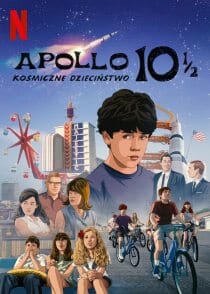 Year: 2022
Year: 2022
Director: Richard Linklater
Stars: Milo Coy, Jack Black, Glen Powell, Zachary Levi, Josh Wiggins, Lee Eddy, Bill Wise, Natalia L’Amoreaux, Jessica Brynn Cohen, Sam Chipman, Danielle Guilbot
Rating: PG-13
Paste Review Score: 8.0
Near the end of Apollo 10 ½: A Space Age Childhood, Richard Linklater’s luscious rotoscope ode to the tail-end of the 1960s, the father of our young protagonist Stanley (Milo Coy) worries that his son slept through a historic event. “Even if he was asleep,” says Stanley’s mom (Lee Eddy), “he’ll one day think he saw it all.” The magic trick that is memory serves as the basis of Apollo, a film that recalls Apollo 11 from the rose-colored perspective of Stan, a ten-year-old boy living in Houston—Linklater’s childhood stomping grounds—at the time of the mission. The film begins with two suited men pulling Stan aside at school and informing him that NASA accidentally built a spaceship that was too small for an adult to ride in. Given this, they’ll need Stan to perform a test run to the Moon instead of one of their highly trained adult astronauts. What follows is a 90-minute, highly sentimental, kaleidoscopic examination of 1969, spliced with moments from the greatest fantasy of the Stanleys of the world: Traveling to space. Linklater doesn’t spare any detail of what life was like back then, nor does he worry about boring audiences by delving into the minutiae of it all. Grown-up Stanley (Jack Black), Apollo’s narrator, bounces confidently between descriptions of the monotonous games the neighborhood kids used to play, breakdowns of the plots of old black-and-white sci-fi shows, the conservative methodologies Stanley’s mom applies in making school lunches for her kids, the nuances of spending time with grandparents who lived through the Depression and everything in between. Everything in the film that has to do with chronicling life in 1969 is so captivating on its own that one can’t help but wonder what Apollo would be like if it removed Stanley’s outer space subplot altogether. Still, where Apollo succeeds, it really succeeds. It’s a stylish meditation on childhood that isn’t afraid to indulge in all the sentimentality that goes along with that. Almost 30 years after Dazed and Confused, Linklater is still reminding us exactly why childhood is a uniquely special thing.—Aurora Amidon
15. Wendell & Wild
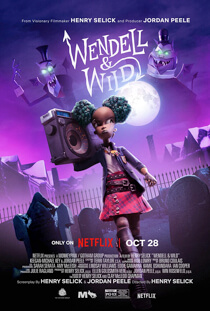 Year: 2022
Year: 2022
Director: Henry Selick
Starring: Jordan Peele, Keegan-Michael Key, Angela Bassett, Lyric Ross, Ving Rhames
Genre: Animation, Comedy
Rating: PG-13
Early on, Wendell & Wild feels like it might not be for kids so much as inebriated adults. Over the course of its runtime, that is revealed to be a reductive appraisal—it’s a spooky coming-of-age comedy made of sad and dramatic moments which demonstrate the importance of community resistance to corporate control of the government. The plot has enough going on that it could have been a TV series or a two-parter, but for whatever its flaws or limitations, it flows coherently for 106 minutes to a satisfactory conclusion. All the while, it’s a marvel of artistry and artisanship, with a soundtrack full of Black-fronted rock bands to boot. Kat (Lyric Ross), a young green-haired Black girl, loses her parents—pillars of their community—in a car accident and is roughed up over the years by the juvenile justice system as the film visually summarizes through shadow-puppet illustrations of memories. It’s a nice added layer, artistically and didactically. A grant-funded reintegration program brings Kat back to her now largely-deserted hometown, Rust Bank, and its eponymous private Catholic school. There, Kat discovers her supernatural connection to the underworld through Wendell (Keegan-Michael Key) and Wild (Jordan Peele). Wendell & Wild reminded me of Beetlejuice and Nightmare Before Christmas, but it isn’t cribbing from what has come before. It’s building on it, and kids and parents everywhere are lucky to have this film. Selick hasn’t directed a lot of movies, but his films have a lasting impact, etching themselves in the memories of their audiences for decades. —Kevin Fox, Jr.
16. The End of Evangelion
 Year: 1997
Year: 1997
Director: Hideaki Anno, Kazuya Tsurumaki
Stars: Megumi Ogata, Megumi Hayashibara, Yuko Miyamura, Kotono Mitsuishi, Fumihiko Tachiki, Yuriko Yamaguchi
Genre: Anime, Sci-Fi, Action
Rating: TV-MA
The final two episodes of Neon Genesis Evangelion are notorious among fans of the series. Titled “Do you love me?” and “Take care of yourself,” the two-part finale infamously sidelined the climactic finale to the series’ central conflict, instead opting to take place entirely away from the action within the subconscious of the show’s protagonist, Shinji Ikari, as he wrestled to resolve the self-loathing and hatred which plagued him throughout the story’s duration. The unconventionality and unsatisfying nature of this conclusion prompted disgruntled fans to issue death threats on Anno’s life and Gainax’s building to be defaced with graffiti. In response, Anno set to work on an alternative ending to the series to be produced in two parts and aired in theaters. If you were looking for a light, campy and celebratory conclusion, End of Evangelion is not that movie. Instead, what fans were treated to was perhaps one of the most fatalistic, avant garde and, oddly enough, life-affirming endings to an anime series ever produced. In short, it is the best and worst of everything that is Evangelion combined to create a film that is unlike anything that had come before it. Despite its unrelenting darkness, End of Evangelion remains true to the ethos of its subtitle, that the joy of death is in the act of rebirth.—Toussaint Egan
17. The Boxtrolls
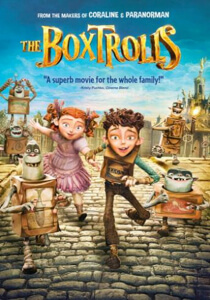 Year: 2014
Year: 2014
Directors: Graham Annable, Anthony Stacchi
Stars: Isaac Hempstead Wright, Ben Kingsley, Elle Fanning, Dee Bradley Baker, Steve Blum, Toni Collette, Jared Harris, Nick Frost, Richard Ayoade, Tracy Morgan, Simon Pegg
Genre: Animated, Comedy, Kids & Family
Rating: PG
“They’ll gnaw your knees!” “They’ll pick their teeth with your bones!” The citizens of Cheesebridge have little love for boxtrolls, creatures who live in the underbelly of Cheesebridge and are vastly misunderstood. Boxtrolls are curious, kind little monsters, but Archibald Snatcher (Ben Kingsley), a man desperate for prestige, wants to use them for his own selfish gain. He decides to start a smear campaign against the boxtrolls so that he can kidnap and kill all of them, forcing the powers-that-be in Cheesebridge to finally award him his coveted White Hat. Standing in Snatcher’s way is Eggs (Isaac Hempstead Wright), a young boy adopted by the boxtrolls as a baby, and Winnie (Elle Fanning), the daughter of Cheesebridge’s most elite aristocrat (Jared Harris). As is typical with many children’s films, no adults will listen to our two heroes as they speak out in support of the boxtrolls, so they must take matters into their own hands. The animation is breathtaking, the boxtrolls themselves are lovely little heroes, and the theme of being true to oneself comes across as very honest. It is the type of movie that kids and adults will both love.—Andy Herren
18. A Shaun the Sheep Movie: Farmageddon
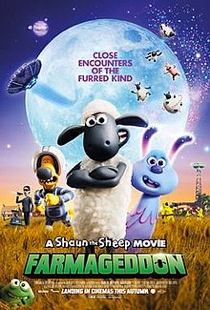 Year: 2020
Year: 2020
Directors: Richard Phelan, Will Becher
Stars: Justin Fletcher, John Sparkes, Amalia Vitale
Genre: Animated, Comedy, Kids & Family
Rating: PG
The second Aardman film featuring the smirking, chuckling lil’ scamp Shaun the Sheep, A Shaun the Sheep Movie: Farmageddon takes all the painstakingly lovely claymation of the studio’s previous film and its Wallace and Gromit and Chicken Run-filled filmography (which see cameos over the course of the media-stuffed movie) and gives it a broad coat of sci-fi paint. The resulting slapstick, which sees cute baby alien Lu-La stumble onto Mossy Bottom Farm, traverses territory familiar to any fan of the genre while making it accessible to everyone—think of it like a hilarious silent comedy giving young kids a piggyback ride through the likes of E.T., Close Encounters, and The X-Files. Helmers Richard Phelan and Will Becher keep things lively and sharp, with a rollicking pace and diverse antics that are as timeless, hilarious, and age-agnostic as the work of Chaplin, Keaton, and Lloyd. Just fluffier. Farmageddon even taps a bit into a Pixar-esque message system (albeit a simpler theme targeted towards a younger set) about kindness and empathy regardless of differences. It’s a soft and simple movie, with much more in common with the easygoing vibe of kid’s animated TV rather than the sharpest of British comedy, but it’s one that’s completely enjoyable—and that’s a rarity for any film, let alone one basically guaranteed to put at least one livestock-driven smile on your face. —Jacob Oller
19. The Witcher: Nightmare of the Wolf
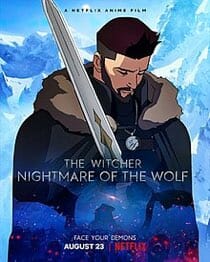 Year: 2021
Year: 2021
Director: Kwang II Han
Stars: Theo James, Lara Pulver, Graham McTavish, Mary McDonnell
Genre: Fantasy
Rating: TV-MA
Netflix series The Witcher was a rather massive hit for the streaming platform in 2019, introducing mainstream audiences everywhere to the dangerous world of Geralt of Rivia, a magically enhanced professional monster hunter known as a Witcher. Like a lot of prequels, the animated film Nightmare of the Wolf can often feel more interested in table setting for the next season of the live-action series than in telling a standalone story of its own. Your mileage will likely vary on whether you think that’s a good idea or not—hardcore fans will be delighted by the frequent namedropping and amped-up violence in the lead-up to the series’ return, while casual viewers may wonder what the big deal about any of this is. But Nightmare of the Wolf works because it unabashedly doubles down on much of what makes the original series so appealing, namely the rich lore that surrounds the existence of Witchers in general. And in doing so, it makes the original series feel like something much larger than one man’s story, expanding its world in a way that makes almost every aspect of it seem more complex and interesting than it did before. The film is technically a Vesemir origin story, but it’s also a crash course in how Witchers came to be, from the harsh conditions in which they are created to the uncomfortable position they occupy in the politics and cultural consciousness of the Continent. But most of all, Nightmare of the Wolf continues to muddy the moral waters of the Witcher universe, crafting complex characters in every shade of grey imaginable. Nightmare of the Wolf’s broader message about how we often create the monsters we fear the most certainly isn’t new. But those familiar beats ultimately help us see the world of the live-action series—and Geralt’s place in it—in a different way than we did before, one which both justifies the Continent’s distrust of Witchers and deepens our understanding of why these remaining men have chosen to keep on fighting anyway. —Lacy Baugher Milas.
20. My Father’s Dragon
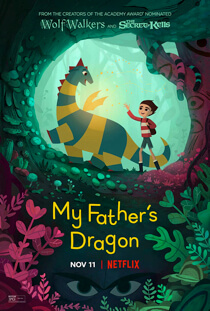 Year: 2022
Year: 2022
Director: Nora Twomey
Stars: Jacob Tremblay, Gaten Matarazzo, Golshifteh Farahani, Dianne Wiest, Rita Moreno
Genre: Animation, Fantasy
Rating: PG-13
My Father’s Dragon, the latest film from Ireland’s Cartoon Saloon, is directed by studio co-founder Nora Twomey and based on the beloved children’s book of the same name created by Ruth Stiles Gannett. This adaptation brings to life, in gorgeous 2D animation, a kaleidoscope of surreal visuals and strange creatures encountered by a little boy and his dragon friend. Theirs is an intimate story about processing fear, especially speaking to those children wrestling with the burdens of having to emotionally navigate real-world stresses that invade their lives too soon. Like Gannett’s book, My Father’s Dragon is also narrated (sparsely) by the unseen grown child (Mary Kay Place) of the story’s protagonist, Elmer Elevator (Jacob Tremblay). She sets up an adventure Elmer had in his childhood that not only utilized his talent for finding things, but was also life-changing, involving a talking cat (Whoopi Goldberg) and a dragon (Gaten Matarazzo). Twomey and her artists have done the magic of staying within the illustration aesthetic of their studio’s signature approach, while expanding that into a more surrealistic and fanciful approach that feels individual and unique. It will especially appeal to the sensitive kids (and adults) in your life, and it most definitely meets the high standards Cartoon Saloon continues to make in the medium. —Tara Bennett
21. Klaus
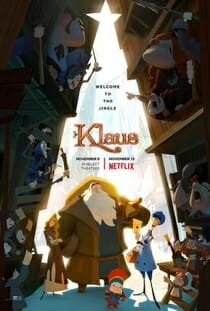 Year: 2019
Year: 2019
Director: Sergio Pablos
Stars: Jason Schwartzman, J.K. Simmons, Rashida Jones, Will Sasso, Norm Macdonald, Sergio Pablos
Genre: Adventure, Family
Rating: PG
Sergio Pablos’ lauded Netflix film Klaus would be a Christmas mythology origin for the ages just on its looks alone, but its complex and mature telling should woo plenty of adults and savvy kids by being a (wood)cut above pretty much all of its animated ilk. The story of its isolated people—from its postman (Jason Schwartzman) to its toy-making hermit (J.K. Simmons) to the ferryman (Norm Macdonald) connecting them all—and feuding clans might contain too much narrative for younger viewers, but its message is crystal clear: Even if started for the wrong reasons, good actions can bring about good results. Some incredible, complex lighting gives the hot-and-cold film’s interiors the look of a fireside, while its exaggerated characters are a delight to watch navigate its realistic world. Not every piece of pop culture needs an origin story, but if they’re as nuanced and beautiful as Klaus, they stand to stuff the stockings of our legends with more than coal. —Jacob Oller
22. Cloudy with a Chance of Meatballs
 Year: 2009
Year: 2009
Directors: Phil Lord, Christopher Miller
Stars: Bill Hader, Anna Faris, James Caan, Neil Patrick Harris, Andy Samberg, Will Forte, Bruce Campbell
Genre: Adventure, Family
Rating: PG
The director-producer team of Phil Lord and Christopher Miller have worked on everything from animated films The Lego Movie and Spider-Man: Into the Spider-Verse to live action comedies 21 Jump Street and The Last Man on Earth. But they got their start adapting and directing the perfectly enjoyable kids film Cloudy with a Chance of Meatballs based on Judi and Ron Barrett’s classic 1978 book. In the film, inventor Flint Lockwood (Bill Hader) on the tiny island of Chewandswallow finally finds success with a machine that turns water to food. All is well until a tornado of spaghetti and meatballs threatens the island and Flint must work against the corrupt mayor (Bruce Campbell) to save everyone from destruction. Lord and Miller’s quirky humor is on display, backed by a funny cast: Anna Faris, Neil Patrick Harris, Andy Samberg, Will Forte, Mr. T and, appropriately, Al Roker. —Josh Jackson
23. Over the Moon
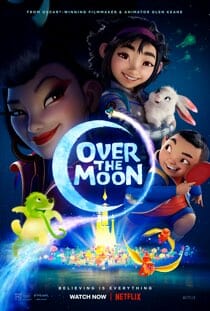 Year: 2020
Year: 2020
Director: Glen Keane
Stars: Cathy Ang, Phillipa Soo, Ken Jeung
Genre: Adventure, Family
Rating: PG
Over the Moon was Netflix’s first bold step into the realm of producing animated films to rival those of Disney. Directed by former Disney animator Glen Keane, who was responsible for bringing films such as The Little Mermaid, Aladdin and Tangled to life, and containing a collection of catchy and heartwarming songs, explosively colorful animation and a story immersed in Chinese culture, the film seems to have all the pieces of another animation classic. The film follows a 14-year-old Chinese girl named Fei Fei (Cathy Ang) living with her now-single father four years after the passing of her mother. Still grieving her loss, Fei Fei clings to her mother’s traditional stories of the goddess Chang’e (Phillipa Soo) living on the moon, awaiting her departed lover, and believes that if she can prove to her father that Chang’e exists, he will follow her example and stop trying to start a new family. Even if poorly contextualized, the beautiful animation sequences of Over the Moon can’t be ignored, and there are times when the colorful display is mesmerizing enough to distract from the plot confusion. There’s a good chance that very young kids will love the movie for its bright colors and cute animals alone, and its songs are catchy enough to not likely drive their parents up the wall upon the millionth time being played. —Joseph Stanichar
24. Violet Evergarden: Eternity and the Auto Memory Doll & The Movie
 Year: 2019, 2020
Year: 2019, 2020
Directors: Haruka Fujita, Taichi Ishidate
Stars: Yui Ishikawa, Minako Kotobuki, Aoi Yuki, Daisuke Namikawa
Genre: Anime, Drama, Fantasy
Rating: TV-PG
The key to Violet Evergarden is that it’s about the future. Violet, a former child soldier who survived a war and lost both her arms, has to face that future, and she can’t help but look backward. Her day job has her ghostwriting clients’ thoughts and memories. She endures PTSD-fueled echoes of her own past constantly. She yearns for her beloved superior officer who (we think?) died. And throughout, she struggles both physically, with her prosthetic hands, and socially, with everyone she meets. So much anime, including many titles on this list, focuses on conflicts during wartime; it’s rare to see one go all in on the conflicts that come with peace. Violet Evergarden’s argument—that those aftereffects are surmountable—is a compelling, important one. —Eric Vilas-Boas
25. The Boss Baby
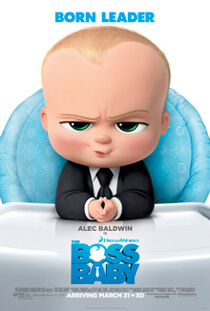 Year: 2017
Year: 2017
Director: Tom McGrath
Stars: Alec Baldwin, Lisa Kudrow, Jimmy Kimmel, Steve Buscemi
Genre: Comedy, animation
Rating: PG
By all accounts, Tom McGrath’s The Boss Baby is a bizarre film. It imagines that the horror of displacement from the center of one’s family is analogous to corporate takeover (with new babies churned along on a conveyor belt, a select few chosen for “upper management”); that capitalism is so entrenched in the way we think and operate it shapes how we view conception; and that the selfishness of babies is comparable to the dispassionate self-interest of the Suits. Still, most poignantly, it dissects not only how we feel about validation, but how we prioritize it. Its recent Academy Award nomination has sparked skepticism, but perhaps its vivacity and emotional acumen make it both deserving of its nod. When the arrival of a younger brother (Alec Baldwin as Theodore, though the movie mostly refers to him as the Boss Baby) upends seven-year-old year old Tim Templeton’s (Miles Christopher Bakshi) domestic life–once filled with phantasmagorically imaginative episodes of adventure for only him and his parents–Tim initially sets out on a quest to mark his territory. Unused to the attention not being on him, he butts heads with his new baby sibling, and the two vie for their parents’ (Jimmy Kimmel and Lisa Kudrow) attention. The Boss Baby looks like a manager, an uncompromising force all suited up, and the tension between the two reaches a detente when the Boss Baby reveals his identity and his mission: He is an undercover manager from BabyCo (where babies come from!) sent to Earth to recenter love and attention on babies because scientifically manufactured young pet animals have become a threat to the status quo. It is both a comedy of sibling rivalry and a corporate espionage film. The Boss Baby articulates a simplified version of Karl Marx’s theory of alienation, specifically the alienation of the worker from the act of production. Even though he makes it to the top of the hierarchy that exists within Baby Corp, the Boss Baby soon realizes that since he experiences such detachment from that labor, he might as well give it up altogether. The film’s reinforcement of nuclear family ideals ends up somewhat more egalitarian; the masculinist obsession with corporate success turns out, in fact, to be hollow and stultifying. That it can delineate between all these different types of fulfillment with such panache more than makes The Boss Baby worthy of a cookie. And cookies are for closers. —Kyle Turner
26. Vivo
 Year: 2021
Year: 2021
Director: Kirk DeMicco, Brandon Jeffords
Stars: Lin-Manuel Miranda, Ynairaly Simo, Zoe Saldaña, Juan de Marcos González, Brian Tyree Henry, Gloria Estefan, Nicole Byer, Michael Rooker, Leslie David Baker, Katie Lowes, Olivia Trujillo, Lidya Jewett
Genre: Animation, Comedy
Rating: PG
Lin-Manuel Miranda’s gift with music is unparalleled. He has the unique ability to pair a rapid and clever turn of phrase with an infectious musical hook. The cadence of his voice conveys a longing and hopefulness which, it turns out, works if you are playing one of the founding fathers or an adorable animated animal. Miranda is the perfect choice to voice the title character in the new Netflix movie Vivo. Vivo is a kinkajou, also known as “honey bear,” a rainforest animal in the raccoon family (although Vivo, with his jaunty hat and stylish scarf, is a lot cuter than a raccoon). Vivo spends his days performing with his owner Andrés (Juan de Marcos González) in Havana, Cuba. Vivo thinks his life and its comfortable predictability is perfect. (Viewers can understand Vivo, but to Andrés and everyone else in the movie, Vivo speaks in adorable coos and gibberish.) One day Andrés gets a letter from his old love Marta Sandoval (Gloria Estefan) asking if he will perform with her one last time at her farewell performance in Miami. Andrés finds the love song he wrote for her years ago and decides he must get the song to her. Alas, a tragedy prevents Andrés from making this journey and Vivo decides he must leave the security of the world he knows to get this song to Marta. Vivo’s travels take him from Havana to Key West to the Everglades to Miami. Along the way he meets Gabi (Ynairaly Simo), a confident, purple-haired 10-year-old who is not in the mood to be like all the other girls. Vivo serves as a vibrant love letter to Cuba, Florida and the people who inhabit them. The more diversity shown in movies aimed at children, the better. Even if this version of Florida is nothing like what we are seeing in the news these days, I’m all for this aspirational Florida. Part adventure, part wistful romance—alongside some nice lessons imparted about friendship, family and taking risks—Vivo is enjoyable and familiar. It probably isn’t a children’s movie we will still be talking about years from now, but I will at least be singing “My Own Drum” for days. —Amy Amatangelo
27. One Piece Film: Gold
 Year: 2016
Year: 2016
Director: Hiroaki Miyamoto
Stars: Mayumi Tanaka, Kazuya Nakai, Akemi Okamura, Kappei Yamaguchi, Hiroaki Hirata
Rating: TV-14
Eiichiro Oda’s One Piece series stands as one of the great juggernauts of modern anime. Since first premiering in 1997, the madcap adventures of Monkey D. Luffy and his band of pirates have gone on to become one of the best-selling series of all time with over 380 million volumes of the manga sold as of last year. Starting One Piece can be an intimidating challenge for newcomers, what with manga currently ongoing at more than 100 volumes and its television adaptation numbering at more than 1,000 episodes to date, not to mention a dozen tie-in films thrown into the mix and a new live-action series on Netflix. Fortunately, One Piece Film: Gold is a pretty solid entry point for those looking to enjoy the series without having to devote hours to wading through reams of filler episodes and expository fluff. One Piece Film: Gold follows the Straw Hat crew as they encounter Gran Tesoro, a gigantic casino-themed ship made entirely of gold that serves as a luxury bastion for foolhardy criminals and billionaire aristocrats alike. Initially greeted as guests for their storied careers as successful pirates, Luffy and his compatriots are quickly ensnared in the machinations of Gild Tesoro, the ship’s flamboyant captain and chief entertainer. Conscripted into servitude to pay off an impossible debt or see one of their own executed, the Straw Hats instead devise a scheme to escape Gran Tesoro, free everyone imprisoned on the ship, and make off with a tidy sum of gold while doing it. —Toussaint Egan
28. Wish Dragon
Year: 2021
Director: Chris Appelhans
Stars: Jimmy Wong, John Cho, Constance Wu, Natasha Liu Bordizzo, Jimmy O. Yang, Aaron Yoo, Will Yun Lee, Ronny Chieng
Genre: Animation, Adventure, Comedy
Rating: PG
Produced by Sony, Tencent and more, Wish Dragon is Netflix’s newest animated film and the feature debut of Chinese studio Base Animation. It’s also the directorial debut of children’s book author and illustrator Chris Appelhans, who also wrote the movie’s script. There’s a lot to love in Wish Dragon. It’s got cute characters, a sweet—if oversimplified—message and a pleasant animation style, all of which are hard to hate. Set in modern China, the movie follows sweet but naïve college kid Din (Jimmy Wong), who is obsessed with reconnecting with his childhood friend and love interest, Li Na (Natasha Liu Bordizzo). Fortunately for him, he comes across a magical teapot that contains the titular “Wish Dragon” Long (John Cho), who can—say it with me here—grant him three wishes. Killing people and making others fall in love with you are still no-gos, but apparently bringing them back from the dead is fine. Just no time travel. The genie-in-a-bottle story is one that’s been done ad nauseum, and it feels like Wish Dragon copies 90% of Aladdin. We have a magical being who provides much of the movie’s comedy through his theatrical movements, a boy who uses his wishes to impress a girl from a much richer family who yearns for life outside of her highly controlled environment, and an evil group who chases after the hero in order to use the teapot for their own schemes. The different environment and time period helps shake things up, but it still feels unavoidably derivative. —Joseph Stanichar
29. Rocko’s Modern Life: Static Cling
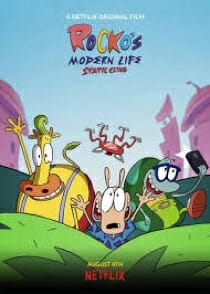 Year: 2019
Year: 2019
Directors: Joe Murray, Cosmo Segurson
Stars: Carlos Alazraqui, Tom Kenny, Charlie Adler, Jill Talley
Genre: Animation, Comedy
Rating: TV-Y7
It’s been 23 years since Rocko’s Modern Life went off the air. A progenitor of SpongeBob SquarePants, with much of the cast and creative team moving on from one show to the next, the satire was Nickelodeon’s in-house answer to its more troublesome The Ren & Stimpy Show. And it was sharp. Deranged. Relatable. Ripped from the daily lives of its writers and unlike any other cartoon airing on TV. So now, with the 45-minute special Rocko’s Modern Life: Static Cling coming to Netflix, how does the original spirit of the show persist? Like any good revival, it makes a point of being familiar but different. Original creator Joe Murray is back on writing and directing duties, alongside all the voice actors (Carlos Alazraqui, Tom Kenny, and Mr. Lawrence) returning to play Rocko, Heffer, and Filburt. The companions, who would feel right at home in either Office Space or a zoo, have been canonically lost in space for two decades since the series finale and finally figure out a way back to Earth. These cartoonish Rips Van Winkle didn’t miss the American Revolution, but they certainly missed enough. With a meta plotline about the cancellation and subsequent rebooting of a beloved cartoon, Static Cling isn’t afraid to be self-effacing about the revival process—or poke a little fun at the fanatical cult audience that got it a second run at Netflix in the first place. Much of what made the show a fan-favorite is still here. Its color-packed, neo-Fleischer Brothers animation (with surreal, askew Chuck Jones backgrounds and images that are just funny enough not to be disturbing, like Rocko’s visible optic nerves when his eyes flying out of his head) and expansive vocabulary balance its fart gags and butt jokes. It’s warm and nostalgic, but only in the sense that its aesthetic maintains a dedication to strangeness. Static Cling is mostly Murray and his team building to their end. It’s them deciding that when Netflix gives you a pulpit, well dammit, you scream your lungs out about what matters. Then you tip your hat and thank everyone for their time. It’s a wish for the future—the special even redistributes the wealth by the finale—masquerading as a return to the past. And it, in the immortal words of Heffer, was a hoot. —Jacob Oller
30. The Willoughbys
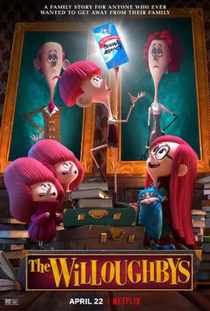 Year: 2020
Year: 2020
Director: Kris Pearn, co-directors Cory Evans and Rob Lodermeier
Stars: Will Forte, Maya Rudolph, Alessia Cara, Terry Crews, Martin Short, Jane Krakowski, Seán Cullen, Ricky Gervais
Genre: Action, Comedy
Rating: PG
Netflix’s oddball Lois Lowry adaptation from director Kris Pearn and co-directors Cory Evans and Rob Lodermeier, The Willoughbys delights in subverting expectations for your traditional family-based animated movie. A plot based around children looking to “orphan” themselves by sending their terrible, abusive, overly lovey-dovey (to each other) parents on a series of increasingly dangerous vacations certainly doesn’t have that slick Disney sheen. For those looking for something a little different, or those with kids a little darker and weirder than those obsessed with cleaned and pressed fairy tale fare, it’s hard to go wrong with the funny and often beautiful Willoughbys. Smart writing, with sharp jokes and intriguingly silly characters (voiced by emphatic all-stars like Will Forte and Maya Rudolph) give the rounded, yarny designs plenty of energy and unending entertainment value—even as the film meanders through detour after detour. A jazzy score from Mark Mothersbaugh pushes further pep, though all that sugar-rush energy would be wasted without its fun, original messaging and story beats. With a few heartwarmers woven in, the film maintains its A Series of Unfortunate Events-esque meanness with a deadpanned straight face all the way to its tonally apt ending. —Jacob Oller
31. A Whisker Away
 Year: 2020
Year: 2020
Director: Junichi Sato, Tomotaka Shibayama
Stars: Mirai Shida, Natsuki Hanae, Hiroaki Ogi, Koichi Yamadera,Minako Kotobuki
Genre: Romance, Fantasy
Rating: TV-PG
There have been creepier things done in movies than magically turning into a cat in order to get closer to your crush, but those are few and far between. It’s not exactly standing outside a window with a boombox. But in directors Junichi Sato and Tomotaka Shibayama’s A Whisker Away, even this bonkers premise yields beauty and touching romance. Mari Okada’s script deftly leaps the anime through some emotional loops, running it through crinkly toy tunnels, ultimately landing its silly premise—replete with a troupe of angsty, depressed middle schoolers—in emotional honesty. A dash of otherworldly magic from the canon of Miyazaki (a corpulent face-dealing cat and an entire invisible cat-world) mixes well with some honest dives into the mental health issues of its characters (not quite as deeply and darkly as Neon Genesis Evangelion, but with a similarly stylish flair). While the characters are a little annoying when you meet them—they’re middle schoolers, after all—the truth behind the writing manages to shine through, all the while impressing us with its realistic animal animation and stunning depictions of smaller-town Tokoname life. —Jacob Oller
32. Megamind
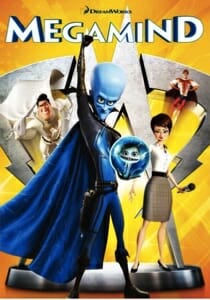 Year: 2010
Year: 2010
Director: Tom McGrath
Stars: Will Ferrell, Jonah Hill, Brad Pitt, Tina Fey
Genre: Animation, Sci-Fi, Comedy
Rating: PG
Featuring the voices of Will Ferrell, Tina Fey, Jonah Hill, Brad Pitt and David Cross, Megamind is a family-friendly superhero-themed movie with a simple premise: What is an arch-villain to do when he successfully and permanently defeats his nemesis? The answer is not really that inspired, but neither is it annoying, wasteful or otherwise an example of the type of misstep so common with subpar superhero movies—this is competent kid fare whose focus on the villain will remind many of Gru and Despicable Me, though the humor falls short of that minion-infested franchise. In this and other particulars, Megamind is unlikely to stick with the viewer long after the closing credits. —Michael Burgin
